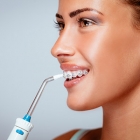
If we were playing word association with the term “oral hygiene,” you'd probably answer “brushing.” And you would be right—brushing cleans tooth surfaces of accumulated bacterial plaque, a thin biofilm most responsible for dental disease.
But brushing is only half of the oral hygiene equation: You also need to remove dental plaque between teeth where brushing can't reach. And, that requires that other practice—flossing.
Unfortunately, brushing is more popular than its hygienic sibling because many people find traditional thread flossing more difficult and messier than brushing. That can make it tempting to skip flossing—but then you're only getting half the benefit of oral hygiene for reducing the risk of tooth decay or gum disease.
There is, however, a way to floss that doesn't involve a roll of thread: oral irrigation. This form of flossing uses a countertop device that directs a pressurized spray of water between teeth through a handheld wand. The directed spray loosens and then flushes away accumulated plaque.
Oral irrigators (also known as water flossers) have been an important tool for decades in dental offices, and have been available for home use since the 1960s. In the last few years, though, the devices have become more compact and easier to use. More importantly, studies have shown they're as effective in removing between-teeth plaque as regular flossing.
These irrigation devices are especially useful for people wearing braces. The attached brackets and wires make it extremely difficult to maneuver flossing thread between teeth. Because of this (as well as similar difficulties in brushing), patients are more susceptible to dental disease while undergoing orthodontic treatment.
But a 2008 study showed that oral irrigators are quite effective for braces wearers in removing between-teeth plaque. It found those who used an irrigator after brushing removed five times the amount of plaque than those that only brushed.
Even if you're not wearing braces, you may still find an oral irrigator to be a useful flossing alternative. Speak with your dentist for recommendations on what to look for in an oral irrigator and tips on how to use it. It could make a positive difference in your dental health.
If you would like more information on how best to keep your teeth and gums clean, please contact us or schedule an appointment for a consultation. You can also learn more about this topic by reading the Dear Doctor magazine article “Cleaning Between Your Teeth.”
